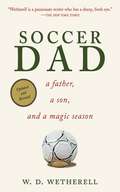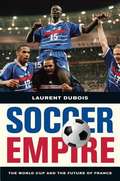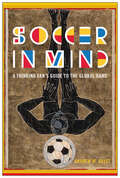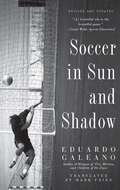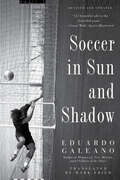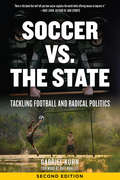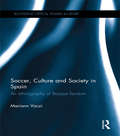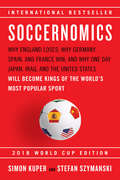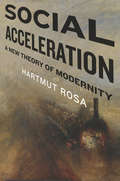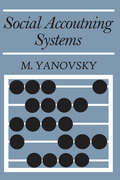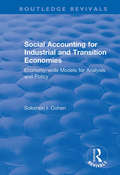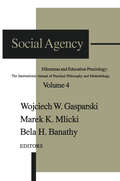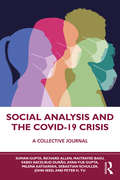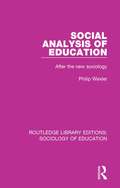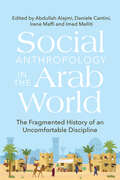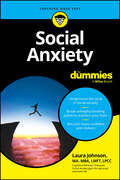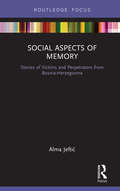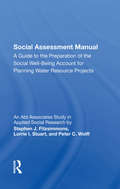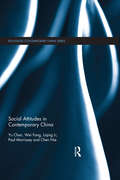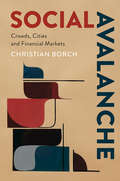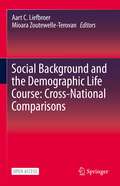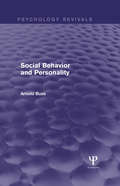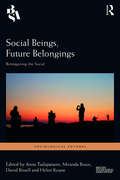- Table View
- List View
Soccer Dad: A Father, a Son, and a Magic Season
by W. D. WetherellWriting with the same descriptive flair that has won his novels so much praise, Wetherell tells the true story of his teenage son's winning soccer season. "Soccer Dad" is simultaneously the candid reflections of a devoted father and die-hard soccer fan.
Soccer Empire: The World Cup and the Future of France
by Laurent DuboisThis book focuses on the history of France and its empire, especially Algeria and the Caribbean, in order to tell a larger story about the link between football and politics.
Soccer in Mind: A Thinking Fan's Guide to the Global Game (Critical Issues in Sport and Society)
by Andrew M. GuestFrom the FIFA World Cup to pick-up games at your local park, soccer is the closest thing in our world to a universal entertainment. Many writers use this global popularity to describe the game’s winners and losers, but what happens when we use social science to explore how soccer intersects with culture, society, and the self? This book provides a thinking fan’s guide to the world’s most popular game, proposing a way of engaging soccer that sparks intellectual curiosity and employs critical consciousness. Using stories and data, along with ideas from sociology, psychology, and across the social sciences, it provides readers with new ways of understanding fanaticism, peak performance, talent development, and more. Drawing on concepts ranging from cognitive bias to globalization, it illuminates meanings of the game for players and fans while investigating impacts on our lives and communities. While it considers soccer cultures across the globe, the book also analyzes what makes U.S. soccer culture special, including its embrace of the women’s game. As a scholar, former minor league player and coach, and fan, Andrew Guest offers a distinctive perspective on soccer in society. Whatever name you call it, and whatever your interest in it, Soccer in Mind will enrich your own view of the one truly global game.
Soccer in Sun and Shadow
by Eduardo GaleanoIn this witty and rebellious history of world soccer, award-winning writer Eduardo Galeano searches for the styles of play, players, and goals that express the unique personality of certain times and places. <P><P>In Soccer in Sun and Shadow, Galeano takes us to ancient China, where engravings from the Ming period show a ball that could have been designed by Adidas to Victorian England, where gentlemen codified the rules that we still play by today and to Latin America, where the "crazy English" spread the game only to find it creolized by the locals. <P>All the greats-Pelé, Di Stéfano, Cruyff, Eusébio, Puskás, Gullit, Baggio, Beckenbauer- have joyous cameos in this book. yet soccer, Galeano cautions, "is a pleasure that hurts." Thus there is also heartbreak and madness. Galeano tells of the suicide of Uruguayan player Abdón Porte, who shot himself in the center circle of the Nacional's stadium; of the Argentine manager who wouldn't let his team eat chicken because it would bring bad luck; and of scandal-riven Diego Maradona whose real crime, Galeano suggests, was always "the sin of being the best." <P>Soccer is a game that bureaucrats try to dull and the powerful try to manipulate, but it retains its magic because it remains a bewitching game-"a feast for the eyes ... and a joy for the body that plays it"-exquisitely rendered in the magical stories of Soccer in Sun and Shadow.
Soccer in Sun and Shadow
by Eduardo GaleanoIn this witty and rebellious history of world soccer, award-winning writer Eduardo Galeano searches for the styles of play, players, and goals that express the unique personality of certain times and places. In Soccer in Sun and Shadow, Galeano takes us to ancient China, where engravings from the Ming period show a ball that could have been designed by Adidas to Victorian England, where gentlemen codified the rules that we still play by today and to Latin America, where the #147;crazy English” spread the game only to find it creolized by the locals. All the greats#151;Pelé, Di Stéfano, Cruyff, Eusébio, Puskás, Gullit, Baggio, Beckenbauer#151; have joyous cameos in this book. yet soccer, Galeano cautions, #147;is a pleasure that hurts. ” Thus there is also heartbreak and madness. Galeano tells of the suicide of Uruguayan player Abdón Porte, who shot himself in the center circle of the Nacional’s stadium; of the Argentine manager who wouldn’t let his team eat chicken because it would bring bad luck; and of scandal-riven Diego Maradona whose real crime, Galeano suggests, was always #147;the sin of being the best. ” Soccer is a game that bureaucrats try to dull and the powerful try to manipulate, but it retains its magic because it remains a bewitching game#151;#147;a feast for the eyes . . . and a joy for the body that plays it”#151;exquisitely rendered in the magical stories of Soccer in Sun and Shadow.
Soccer in Sun and Shadow
by Eduardo GaleanoOne of the greatest, magical, and most lyrical accounts of the beautiful gameIn this witty and rebellious history of world soccer, award-winning writer Eduardo Galeano searches for the styles of play, players, and goals that express the unique personality of certain times and places. In Soccer in Sun and Shadow, Galeano takes us to ancient China, where engravings from the Ming period show a ball that could have been designed by Adidas to Victorian England, where gentlemen codified the rules that we still play by today and to Latin America, where the &“crazy English&” spread the game only to find it creolized by the locals.All the greats—Pelé, Di Stéfano, Cruyff, Eusébio, Puskás, Gullit, Baggio, Beckenbauer— have joyous cameos in this book. yet soccer, Galeano cautions, &“is a pleasure that hurts.&” Thus there is also heartbreak and madness. Galeano tells of the suicide of Uruguayan player Abdón Porte, who shot himself in the center circle of the Nacional's stadium; of the Argentine manager who wouldn't let his team eat chicken because it would bring bad luck; and of scandal-riven Diego Maradona whose real crime, Galeano suggests, was always &“the sin of being the best.&”Soccer is a game that bureaucrats try to dull and the powerful try to manipulate, but it retains its magic because it remains a bewitching game—&“a feast for the eyes ... and a joy for the body that plays it&”—exquisitely rendered in the magical stories of Soccer in Sun and Shadow.
Soccer vs. the State: Tackling Football and Radical Politics, Second Edition
by Gabriel KuhnSoccer has turned into a multi-billion-dollar industry. Professionalism and commercialization dominate its global image. Yet the game retains a rebellious side, maybe more so than any other sport co-opted by money makers and corrupt politicians. From its roots in working-class England to political protests by players and fans, and a current radical soccer underground, the notion of football as the “people’s game” has been kept alive by numerous individuals, teams, and communities. This book not only traces this history, but also reflects on common criticisms: soccer ferments nationalism, serves right-wing powers, and fosters competitiveness. Acknowledging these concerns, alternative perspectives on the game are explored, down to practical examples of egalitarian DIY soccer! Soccer vs. the State serves both as an orientation for the politically conscious football supporter and as an inspiration for those who try to pursue the love of the game away from televisions and big stadiums, bringing it to back alleys and muddy pastures. This second edition has been expanded to cover events of recent years, including the involvement of soccer fans in the Middle Eastern uprisings of 2011–2013, the FIFA scandal of 2015, and the 2017 strike by the Danish women’s team.
Soccer, Culture and Society in Spain: An Ethnography of Basque Fandom (Routledge Critical Studies in Sport)
by Mariann VacziSpanish soccer is on top of the world, at international and club level, with the best teams and a seemingly endless supply of exciting and stylish players. While the Spanish economy struggles, its soccer flourishes, deeply embedded throughout Spanish social and cultural life. But the relationship between soccer, culture and national identity in Spain is complex. This fascinating, in-depth study shines new light on Spanish soccer by examining the role this sport plays in Basque identity, consolidated in Athletic Club of Bilbao, the century-old soccer club located in the birthplace of Basque nationalism. Athletic Bilbao has a unique player recruitment policy, allowing only Basque-born players or those developed at the youth academies of Basque clubs to play for the team, a policy that rejects the internationalism of contemporary globalised soccer. Despite this, the club has never been relegated from the top division of Spanish football. A particularly tight bond exists between fans, their club and the players, with Athletic representing a beacon of Basque national identity. This book is an ethnography of a soccer culture where origins, nationalism, gender relations, power and passion, lifecycle events and death rituals gain new meanings as they become, below and beyond the playing field, a matter of creative contention and communal affirmation. Based on unique, in-depth ethnographic research, this book investigates how a soccer club and soccer fandom affect the life of a community, interweaving empirical research material with key contemporary themes in the social sciences, and placing the study in the wider context of Spanish political and sporting cultures. Filling a key gap in the literature on contemporary Spain, and on wider soccer cultures, this book is fascinating reading for anybody with an interest in sport, anthropology, sociology, political science, or cultural and gender studies.
Soccernomics
by Simon Kuper Stefan SzymanskiThe 2014 World Cup Edition of the book that does] for soccer what "Moneyball" did for baseball. -"New York Times"
Social Acceleration: A New Theory of Modernity (New Directions in Critical Theory)
by Hartmut RosaHartmut Rosa advances an account of the temporal structure of society from the perspective of critical theory. He identifies three categories of change in the tempo of modern social life: technological acceleration, evident in transportation, communication, and production; the acceleration of social change, reflected in cultural knowledge, social institutions, and personal relationships; and acceleration in the pace of life, which happens despite the expectation that technological change should increase an individual's free time.According to Rosa, both the structural and cultural aspects of our institutions and practices are marked by the "shrinking of the present," a decreasing time period during which expectations based on past experience reliably match the future. When this phenomenon combines with technological acceleration and the increasing pace of life, time seems to flow ever faster, making our relationships to each other and the world fluid and problematic. It is as if we are standing on "slipping slopes," a steep social terrain that is itself in motion and in turn demands faster lives and technology. As Rosa deftly shows, this self-reinforcing feedback loop fundamentally determines the character of modern life.
Social Accounting Systems
by Louis FillerSocial accounting grew up as a result of the desire to bring together in a meaningful and comprehensive manner all the available observed facts on the economic and financial activity of a nation. Three social accounting systems of flow have been developed during the last three decades. Each of these systems has been constructed separately and independently. The framework of each system is constructed to tackle specific aspects of the national economy. It is also designed in a manner, which helps in framing policies for future activity. The aim of this book is mainly to describe the anatomy of these three social accounting systems and compare their structures. Some attention is also given to a comparison of the systems in actual use by some industrially developed countries, including the centralized economies. The problem of integrating the three systems is also cursorily treated. The student of economics, and the economist in the service of industry, private or public, will obtain from this book a picture of the concepts and: definitions used in social accounting; the book also describes how each system is constructed, and which economic study or analysis it can best serve. Another valuable feature is the comparison the author makes of the national accounts system with the Russian "Natsional'ny Dokhod." In this far-reaching and complex work, the author has brought together the fruits of his very extensive studies into the social accounting methods of many nations, and he goes beyond the analysis of existing systems to suggest ways of tackling the problems of integrating the three main systems into one. Dr. Yanovsky is at present senior economist in the State Comptroller's Office in Israel. He studied economics in the Universities of Chicago and Manchester (where he obtained his doctorate at the Department of Economics and Social Studies in 1963). It was from a thesis he wrote while in Manchester that he drew the inspiration, and much of the material, for
Social Accounting for Industrial and Transition Economies (Routledge Revivals)
by Solomon CohenThis title was first published in 2002: Showing how the social accounting matrix provides a comprehensive framework for the analysis and tabulation of national statistics and how it can assist in developing economic policy, this work also demonstrates the key aspects of this approach in dealing with a wide range of economic and social issues. The reference, and the accompanying volume, "Social Accounting and Economic Modelling for Developing Countries" should be useful for researchers, instructors, policy makers and scholars.
Social Agency: Dilemmas and Education (Praxiology Ser. #Vol. 4)
by Wojciech W. GasparskiPraxiology deals with doing and working from the point of view of effectiveness. It has three components: analysis of concepts involving purposive actions; critique of models of action from the viewpoint of efficiency; and normative advisory aspects in recommendations for increasing human efficiency. This fourth volume of the Praxiology series is devoted to the very special topic of social agency. It focuses on two important praxiological concepts: rationality and preparation as preconditions for human action to be effective and efficient.The question of efficiency was raised by Anatol Rapoport over three decades ago in his lecture to the audience at the Praxiological Seminar in Warsaw in 1961. Social Agency begins with an article written by this same famous scholar on the topic of decision theory, "Social Dilemmas: A Historical Overview." Social dilemmas is the subject of the first part of this volume, a question related to studies on human action guided by two types of rationality: individual and collective rationality. The intersection of the two, in which individuals meet collectives, creates the situation in which social agency emerges, generating dilemmatic circumstances for the actors involved.The articles collected in the second part explore praxiological dimensions of education aimed toward the knowledge society, because of knowledge possessed and produced by educated persons. Chapters and contributors to volume 4 include: "Five Questions on the Research on Social Dilemmas" by Marek K. Mlicki; "Psychological Processes Underlying Cooperation in Social Dilemmas" by Paul A. M. Van Lange and David M. Messick; "Designing a System for Design Learning: Designers and/or Learners?" by Arne Collen; "Creating an Evolutionary Image of New Systems of Learning and Human Development" by Janet A. Khan; and "A Study Program Design in Retrospect" by Stig C. Holmberg. Social Agency continues the trend of original research done in a little-known, but important area. Social scientists, policymakers, and educators will benefit from this work.
Social Analysis and the COVID-19 Crisis: A Collective Journal
by Richard Allen Suman Gupta John Seed Maitrayee Basu Fabio Akcelrud Durão Ayan-Yue Gupta Milena Katsarska Sebastian Schuller Peter H. TuThis book is a collective journal of the COVID-19 pandemic. With first-hand accounts of the pandemic as it unfolded, it explores the social and the political through the lens of the outbreak. Featuring contributors located in India, the United States, Brazil, the United Kingdom, Germany, and Bulgaria, the book presents us with simultaneous multiple histories of our time. The volume documents the beginning of social distancing and lockdown measures adopted by countries around the world and analyses how these bore upon prevailing social conditions in specific locations. It presents the authors’ personal observations in a lucid conversational style as they reflect on themes such as the reorganization of political debates and issues, the experience of the marginalized, theodicy, government policy responses, and shifts into digital space under lockdown, all of these under an overarching narrative of the healthcare and economic crisis facing the world. A unique and engaging contribution, this book will be useful to students and researchers of sociology, public health, political economy, public policy, and comparative politics. It will also appeal to general readers interested in pandemic literature.
Social Analysis of Education: After the new sociology (Routledge Library Editions: Sociology of Education #57)
by Philip WexlerFirst published in 1987, this book offers an ideological critique of the new sociology of education, with the aim to redeem understanding of the social and historical character of knowledge. It argues that with an historical and social grasp, university knowledge can be understood as a collective product and can become a useful resource for encountering and transforming the social present. To reach this objective, the book reviews the history of the new sociology of education and shows how it is limited by earlier times and social conflicts. In doing so, it aims to continue the unrealized critical analysis that was promised by the new sociology of education and remained contained.
Social Anthropology in the Arab World: The Fragmented History of an Uncomfortable Discipline
by Abdullah Alajmi, Daniele Cantini, Irene Maffi and Imed MellitiThere are ongoing efforts in anthropology to decolonise its history and give fairer space to marginalised traditions. This book examines the history and institutionalisation of anthropology in the Maghreb, the Mashreq and the Gulf, in an open and collaborative manner and from various perspectives. Its primary focus is two-fold: first, to reorient the anthropological focus towards studies conducted in the region, particularly on the conditions conducive to the institutionalisation of anthropological knowledge; second, to shed light on anthropological studies in languages other than English. offering different theoretical and epistemological perspectives.
Social Anxiety For Dummies
by Laura JohnsonBreak free from social anxiety, one step at a time Feeling anxious around people? Not sure where to start? Then this user-friendly, practical resource might be exactly what you’re looking for. This workbook helps you tackle your fear of judgment and worry about what others think of you. You’ll find simple step-by-step instructions, worksheets and real-world examples to help you gain insight and control over your social anxiety. Social Anxiety For Dummies is a solution-focused guide to creating a new mindset about social anxiety and your ability to cope with it. This book has easy-to-understand information and effective strategies to help you make positive changes in your life. Packed with tips and tools to conquer your social anxiety Create positive self-talk, reduce avoidance and face your fears Discover how to deal with social situations, dating, public speaking, kids with social anxiety and workplace anxiety Explore how positive psychology can help you live a life of meaning, with or without social anxiety A complete guide with proven ideas, this is a jargon-free and a fun approach to gaining mastery over your social anxiety. Social Anxiety For Dummies puts you on the fast track to building your self-esteem and confidence.
Social Aspects of Memory: Stories of Victims and Perpetrators from Bosnia-Herzegovina
by Alma JefticSocial Aspects of Memory presents a compelling study of how ordinary people remember war. Whilst the book focuses on the cities of Sarajevo and East Sarajevo during the 1992-1995 war in Bosnia-Herzegovina, Jeftic also presents narratives from other war-torn cities and countries around the world. This book adopts a unique approach, by looking at how perpetrators and victims (as well as new generations who may not remember the war directly) manage in the aftermath of war. Jeftic explores how our memories of war and violence are formed, and how we can learn to reconcile those memories, individually and as a collective. Drawing on the author’s own empirical and extensive research, the book explores the connection between memories for significant war events, transgenerational transmission of memories, bias for in-group wrongdoings and readiness for reconciliation between two groups. Giving a voice to underrepresented narratives and prioritising the importance of expression as a necessary catalyst for reconciliation, this book is essential reading for those interested in collective and transgenerational memory and memory studies, especially in relation to the aftermath of the 1992-1995 war in Bosnia-Herzegovina.
Social Assessment Manual
by Judith Fitzsimmons Edward SampsonA Social Well-Being Account is the product of an assessment of the comparative beneficial and adverse social effects likely to occur as a result of implementing—or not implementing—a particular development plan. This volume establishes procedures for conducting research and analyzing data in order to make this assessment for water development plans
Social Assistance in Developing Countries
by Armando BarrientosThe rapid spread of large-scale and innovative social transfers in the developing world has made a key contribution to the significant reduction in global poverty over the last decade. Explaining how flagship anti-poverty programmes emerged, this book provides the first comprehensive account of the global growth of social assistance transfers in developing countries. Armando Barrientos begins by focusing on the ethical and conceptual foundations of social assistance, and he discusses the justifications for assisting those in poverty. He provides a primer on poverty analysis, and introduces readers to the theory of optimal transfers. He then shifts the focus to practice, and introduces a classification of social assistance programmes to help readers understand the diversity in approaches and design in developing countries. The book concludes with an analysis of the financing and politics of the emerging institutions and of their potential to address global poverty.
Social Attitudes in Contemporary China (Routledge Contemporary China Series)
by Chen Yu Fang Wei Liqing Li Paul Morrissey Nie ChenUnlike many studies of social attitudes, which are based on large scale quantitative surveys, or which focus on the attitude of elites, this book considers the views of ordinary people, and is based on in-depth, qualitative interviews. This approach results in rich, nuanced data, and is especially helpful for highlighting ambivalent attitudes, where respondents may hold positive and negative views on a particular topic, views which are liable to change. The book examines attitudes on a range of subjects of current importance, including views on nationalism and internationalism, housing preferences, and educational ambitions. Throughout, the book explores how far attitudes are influenced by traditional Chinese values or by the neo-liberal outlook fostered by recent reforms, and concludes that materialism and individualism have increased.
Social Avalanche: Crowds, Cities and Financial Markets
by Christian BorchIndividuality and collectivity are central concepts in sociological inquiry. Incorporating cultural history, social theory, urban and economic sociology, Borch proposes an innovative rethinking of these key terms and their interconnections via the concept of the social avalanche. Drawing on classical sociology, he argues that while individuality embodies a tension between the collective and individual autonomy, certain situations, such as crowds and other moments of group behaviour, can subsume the individual entirely within the collective. These events, or social avalanches, produce an experience of being swept away suddenly and losing one's sense of self. Cities are often on the verge of social avalanches, their urban inhabitants torn between de-individualising external pressure and autonomous self-presentation. Similarly, Borch argues that present-day financial markets, dominated by computerised trading, abound with social avalanches and the tensional interplay of mimesis and autonomous decision-making. Borch argues that it is no longer humans but fully automated algorithms that avalanche in these markets.
Social Background and the Demographic Life Course: Cross-National Comparisons
by Aart C. Liefbroer Mioara Zoutewelle-TerovanThis open access book examines how childhood social disadvantage influences young-adult demographic decision-making and later-life economic and well-being outcomes. This book in particular focuses on testing whether the consequences of childhood social disadvantage for adult outcomes differ across societies, and whether these differences are shaped by the “context of opportunities” that societies offer to diminish the adverse impact of economic and social deprivation. The book integrates a longitudinal approach and provides new insights in how the experience of childhood disadvantage (e.g. low parental socio-economic status, family disruption) influences demographic decisions in adulthood (e.g. the timing of family-events such as cohabitation, marriage or parenthood; the risk of divorce or having a child outside a partner relationship; the exposure to later-life loneliness, poor health, and economic adversity). Moreover, using a cross-national comparative perspective it investigates whether the relationships of interest differ across nations, and tests the “context of opportunities” hypothesis arguing that the links between childhood disadvantage and adult outcomes are weakened in societal contexts offering good opportunities for people to escape situations of deprivation. To do so, the book analyzes national contexts based on economic prosperity, family values and norms, and welfare-state arrangements.
Social Behavior and Personality (Psychology Revivals)
by Arnold H. BussThe fields of social behaviour and personality had for the most part been studied separately, originally published in 1986, this title was one of the first to consider them together. Social behaviours and contexts are analysed and distinctions are suggested. Social behaviours not previously seen as similar are linked. This a great opportunity to rediscover the work of Arnold Buss one of the greats in Social Psychology.
Social Beings, Future Belongings: Reimagining the Social (Sociological Futures)
by Helen Keane Anna Tsalapatanis Miranda Bruce David BissellSocial Beings, Future Belongings is a collection of sociological essays that address an increasingly relevant matter: what does belonging look like in the twenty-first century? The book critically explores the concept of belonging and how it can respond to contemporary problems in not only the traditional domains of citizenship and migration, but also in detention practices, queer and feminist politics, Australian literature and fashion, technology, housing and rituals. Drawing on examples from Australia, Europe, the United Kingdom and the United States, each topic is examined as a different kind of problem for the future – as a toil, an intensity or a promise. Ultimately, the collection argues that creating new ways to belong in contemporary times means reimagining the traditional terms on which belonging can happen, as well as the social itself. Read on their own, each chapter presents a compelling case study and develops a set of critical tools for encountering the empirical, epistemological and ontological challenges we face today. Read together, they present a diverse imagination that is capable of answering the question of belonging in, to and with the future. Social Beings, Future Belongings shows how belonging is not a static and universal state, but a contingent, emergent and ongoing future-oriented set of practices. Balancing empirical and theoretical work, this book will appeal to researchers, students and practitioners alike.
